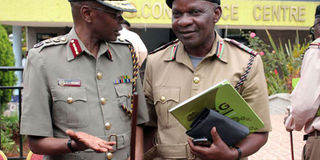Why we need urgent talks on policing

Inspector General of Police Joseph Boinnet (left) chats with Coast Regional Coordinator Nelson Marwa at the Kenya School of Government in Nairobi on October 23, 2017, during a meeting on security preparedness ahead of the presidential election. There is an urgent need for a public conversation around policing. PHOTO | DENNIS ONSONGO | NATION MEDIA GROUP
What you need to know:
- IMLU’s preliminary research shows that between August 26 and August 30, 34 Kenyans were shot and 13 died.
- It is the duty of the living to speak for those killed and IMLU are taking that leadership role.
Last month’s rerun presidential election will be remembered for a variety of reasons but few of those memories will bring much joy.
An incident that I savour, however, was when intervention was required to halt an angry crowd in Bangladesh, Mombasa, who attempted to demolish a wall because they mistakenly believed that ballot boxes were being stuffed behind it.
The police were ready to repulse the attack until I persuaded Changamwe OCS Alex Busienei to give me a chance to talk to the hundreds of youth.
TENSION
He not only agreed but took my hand and promised to give cover in case I was assaulted.
After some time the youth accepted our version and tension was reduced.
However, what sticks in my memory was not the risk that I took but the coolness and professionalism with which the OCS handled a potentially dangerous situation.
Discipline, dialogue and patience won the day and I acknowledge Mr Busienei’s approach.
POLICE KILLINGS
While it is fitting to acknowledge individual officers who handled election protests in a professional way, it would appear that just a handful were willing to engage in such a manner during the August and October elections.
While the National Police Service (NPS) boasted that they were thoroughly prepared to handle every type of incident, the reality is that in opposition strongholds excessive and unnecessary force was used.
According to the Independent Medico Legal Unit (IMLU), 36 Kenyans aged between six months and 36 years of age were killed by police: 23 in August and another 13 in October.
EXECUTION
Not surprisingly, the police spokesman, George Kinoti, dismissed the report as ‘sensational, malicious and misleading’, claiming that its aim was to taint the image of the NPS.
However, Mr Kinoti made no reference to the evidence that the post-mortem reports on 11 victims revealed.
The IMLU PMs showed that the 11died of gunshots wounds and three of them had multiple gunshots.
Seven were shot in the chest and two in the back.
In none of the killings was there any evidence to suggest that police were shooting to defend themselves or others.
This was blatant execution without any effort made to immobilise the attackers.
JUSTICE
Those post-mortems were done in August and results from the October ones will soon be available.
However, IMLU’s preliminary research shows that between August 26 and August 30, 34 Kenyans were shot and 13 died, with 51 still being treated in hospital from gunshot wounds and beatings.
Of course these figures cannot compare with the 450 killed by police in the post-election violence of 2007-8.
Nevertheless, the dead cannot cry out for justice.
REFORMS
It is the duty of the living to speak for them and IMLU are taking that leadership role.
Consistent denial of responsibility even when evidence speaks for itself is not helping public confidence in the NPS.
Individual officers like Busienei cannot alone redeem the reputation of the service.
There is an urgent need for a public conversation around policing because the reform process has never taken shape and the obstacles appear to be at the NPS and the political elite.
This debate must be national for Kenyan lives matter everywhere.
Fr Gabriel Dolan is a Catholic priest based in Mombasa. [email protected] @GabrielDolan1




